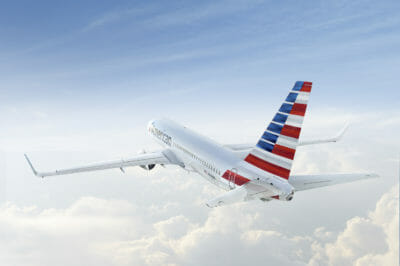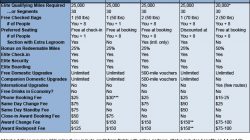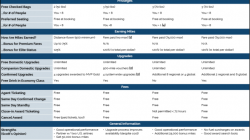As I plan my move away from United Airlines’ MileageMinus program, I want to make clear that leaving United doesn’t necessarily mean I am moving anywhere. There is a difference between not finding value with United and thinking I will find more value with another airline.
I think it is worth considering that we may no longer be in a time when airline status can provide greater benefits than the cost to earn. As I replied to a reader yesterday, I haven’t “hacked” any fares at all this year. I’ve only been trying to take maximize the return I get from the loyalty program.
Airline status still offers value to those who will fly anyway. Are you a frequent business traveler, Monday through Thursday, every week? I hope you include your loyalty account number on your reservations. I won’t argue with that. But what about some of us with more discretionary travel needs?
Everyone Has a Price
United Airlines and Delta Air Lines have put a price on your loyalty. I would argue that’s not loyalty at all. Not to say these businesses don’t have a right to focus on their most profitable customers, but it isn’t quite the same thing. Paraphrasing Rob Johnson in the comments yesterday, to argue that you’ve spent X dollars with a company and deserve an upgrade is not very different from a fee-for-service model. Just buy a first class ticket. Loyalty is the guy who’s flown the carrier every other week despite competing fares or schedules because he feels the airline takes care of him. But I digress… The future is coming and we need to learn to adapt.
Some commenters on FlyerTalk have mentioned the idea of “dollar runs.” The idea is some people will book the most expensive fare available while traveling the shortest distance because they may have 100,000 elite qualifying miles but not anywhere close to $10,000 elite qualifying dollars. Wandering Aramean and others called this idea foolish, but I’m not so sure. Certainly it will not be common, but I imagine more than a few people will have ordinary business travel that takes them near Premier 1K (and beyond the opportunity for a credit card waiver).
And these airlines are not the only ones. JetBlue, Southwest Airlines, and Virgin America all operate fixed-value loyalty programs. Credits are earned based on spend, which means their elite status tiers also have a price. Southwest even has its own credit-card waiver program! Like United giving you the option to waive the PQD requirement if you spend $25,000 per year, Southwest lets you earn tier credits through spend on your Rapid Rewards credit card.
US Airways provides the option to outright buy elite status (for much less), but I don’t see this lasting much longer after the merger. Then again, who knows what the new American might do? We only have vague promises that the merged carrier will adopt AA’s service levels.
Benefits Can Be Purchased
I think most discretionary travelers will find they are better off paying for the a la cart upgrades or first class tickets on the longer routes where it matters rather than investing the extra time and money in mileage runs to earn elite status. Most of the time I don’t really care about an upgrade, like when flying two hours to San Francisco. I just care about flying in a real jet, not a piddly CR7. I don’t get upgraded on CR7s even as a Premier 1K. So it probably makes more sense to buy a cheaper ticket from Alaska Airlines and have my pick of San Francisco or Oakland with a better schedule and a better plane than United’s relatively dismal service on this route.
More and more it is becoming possible to simply buy the benefits you need. Extra legroom, early boarding, priority check-in, and checked baggage? Those can all be purchased or received as benefits of co-branded credit cards. About the only value still provided by elite status are in the form of:
- Bonus miles
- Better customer service
- Complimentary upgrades
Argument Against Bonus Miles
Miles can be outright purchased. Not just through the airline but through many other avenues, as well. Manufactured spending creates plenty of opportunity to buy miles more cheaply and in greater quantities than ever before. Is it worth paying an extra $1,000 (either for more expensive options on a preferred carrier or unnecessary mileage runs) just to earn a 100% bonus?
Vanilla Reloads can be used to “purchase” miles of just about any sort at a maximum price of 0.79 cents each. You could get over 125,000 miles for $1,000, more than any 100% bonus would provide. There are many other methods that are cheaper or even free — though they aren’t always as easy to implement and scale.
Customer Service Can Be Purchased
I don’t want to get bogged down with differences between individual carriers. I think United has made it harder and harder for their elite members at all levels to receive some premium level of service. Other airlines may be better, but it’s always easy to image the grass is greener.
Here’s my question: In what form does your improved customer service arrive? Remember, priority boarding and so on can be purchased separately, and I’ll get to upgrades in a bit. Remaining are things like a free drink in economy class, faster access to telephone agents, and priority consideration for standby or flight changes.
Some of these benefits are minor (drinks), some are diluted (United no longer guarantees Premier 1Ks can speak to a Premier 1K agent), and some can be purchased in another form (special consideration for premium fares). You will probably get better service as a paid first class passenger than as a elite member who was provided an upgrade. It could take longer to reach an agent, yes, but I suggest paying $50 to get into the lounge and speaking to an agent there, where the lines are shorter.
Status: Pending
What do you think? I haven’t really made a decision on this matter, but there are more reasons than ever to think that elite status with an airline isn’t worth the effort unless you’ll need to travel anyway. I originally planned to compare the merits of Alaska Airlines and American Airlines, but given recent changes to Delta’s upgrade system and an expansion of their route network in the Seattle area, I think they deserve some attention, too. I’ll have a post on each carrier next week. For now, Alaska is winning — but only because I think I might rely on award tickets for international travel.
In the meantime, tomorrow I will extend this discussion with some ideas for why I think status with a hotel loyalty program continues to be a good idea.




